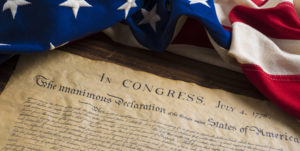A Nationalist Argument Against Protectionist Tariffs
Nationalism is the support of one’s national interests, often to the detriment of other nations’ interests. Protectionism and nationalism often go hand-in-hand as protectionist tariffs are seen as necessary for promoting and protecting national interests. I am no nationalist (indeed, I regard it as an evil ideology on par with socialism and fascism); here I want to question the link between nationalism and protectionism. I argue that, if one is a nationalist, one should oppose protectionism, as protectionism weakens the body politic and national unity.
Protectionism, through tariffs and subsidies, aims to support various industries that are designated by the government as vital to serving national interests. These can be military industries (shipping, arms manufacturing, key inputs and natural resources, etc), technologies (superconductors, AI research, etc), or goods necessary for national life (food, arts, entertainment, etc). There is, of course, the mundane and general point that resources are scarce and that support of these industries necessarily comes at the expense of other industries. This favoritism can sow the seeds of national discord and division, but it is unlikely to alone weaken the body politic.
Rather, what is likely more important is the fact that industries tend to cluster and become regional. In technical terms, there are external economies of scale: firms may cluster together to take advantage of a common resource, reduce transaction costs, or reduce other costs, allowing them to produce more at a lower average cost. Famous examples of these external economies of scale include Silicon Valley, Dalton Georgia, Detroit, or the biomedical research cluster in Boston Massachusetts.
The fact that industries cluster, rather than are spread out randomly, throughout a nation is what leads to protectionism weakening the body politic. Certain regions of the nation are favored at the expense of other regions. The other regions may be upset that they are being deliberately harmed at the expense of other groups. In the language of Carl Schmidt, the “friend-enemy” distinction is no longer aimed at people outside the nation, but rather at the nation itself; the unity is severed as people within the nation start seeing other nationals as an “enemy.” This internal disunity subsequently leads to internal discord and, in extreme cases, breaking up of the national identity.

In the US, there are several examples of this regional disunity weakening the body politic. Indeed, the American Revolution was partially fought because of protectionist tariffs. In the list of grievances against “pretend legislation” contained in the Declaration of Independence, one of them is: “cutting off our Trade with all parts of the world,” a reference to the Navigation Acts. The Navigation Acts favored British shipping and trade at the expense of Colonial trade. In turn, this made the Americans feel discriminated against and lesser as British subjects. Indeed, Adam Smith, himself a (cautious) supporter of the Navigation Acts, argued that they were a “stop in that great blood-vessel” of trade and will “bring on the most dangerous disorders upon the whole body politick” (Wealth of Nations Book IV, Chapter 7, Part III, page 605). How right he was.
After the Revolution, tariffs remained a source of debate among the Founding Fathers and early Congresses. Some, like Alexander Hamilton, wanted tariffs to be for revenue and disrupt trade as little as possible. Others, like James Madison and Thomas Jefferson, argued the new nation should use tariffs to try and compel Great Britain to open trade with the US. Generally speaking, the Hamiltonian idea of a revenue, rather than a protectionist, tariff won out, although there were attempts at protectionism.
The most famous, and most dangerous, of these resulted in the Nullification Crisis. Starting in 1816, the federal government began imposing protectionist tariffs to support Northern manufacturers, but at the expense of Southern manufacturers and farmers. These tariffs culminated in the Tariff of Abominations of 1828. The Southern States, in particular South Carolina, were outraged that the federal government was disadvantaging them so. South Carolina openly challenged the federal government’s authority by declaring the tariff null and void within its borders. Ultimately, the crisis was wound down in 1833 with a new bill that generally gave South Carolina and the southern states much of what they wanted. But that event came dangerously close to fractionating the newly-formed nation (for a longer discussion of this history, see Clashing Over Commerce by Douglas Irwin, Chapter 2).
More recently, such regionalization of industry was weaponized by China during the Trump administration’s trade war. By favoring some industries at the expense of others, the administration opened the door for Chinese retaliation. China retaliated by targeting US agricultural exports in regions that were also swing states. These protectionist tariffs created divisions a supposed enemy could exploit to weaken the body politic.
In conclusion, nationalists should oppose protectionist tariffs given they weaken the body of nation. Perhaps in a small, homogeneous nation-state, where there is little economic diversity, nationalism and protectionism could complement each other (although this is unlikely given that a tariff in such conditions would lead to a net reduction in national welfare). But that is not the case for most nations of the world today, not least of all the United States of America.
Jon Murphy is an assistant professor of economics at Nicholls State University.

